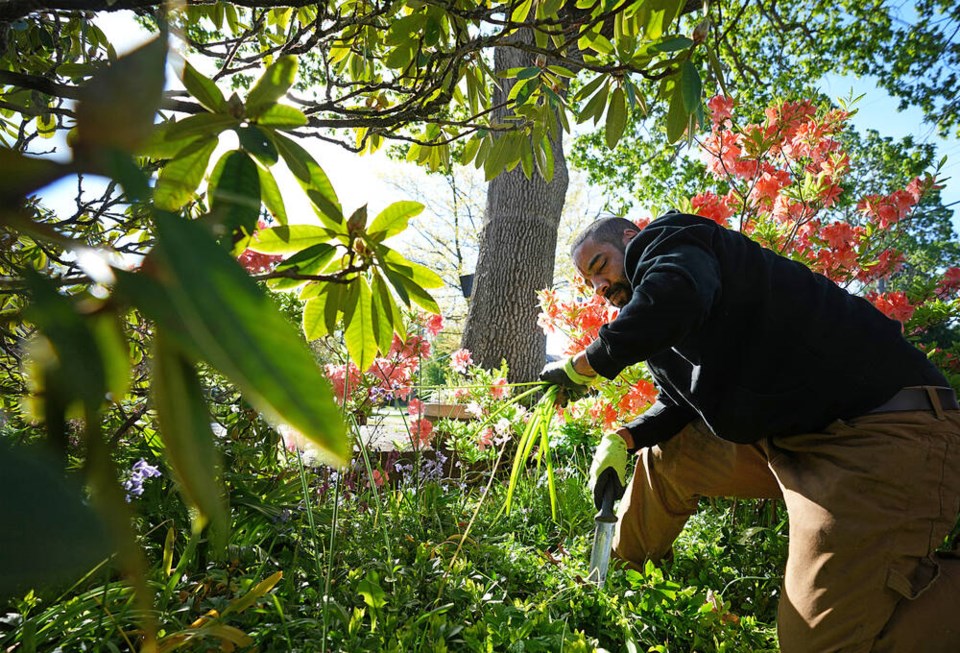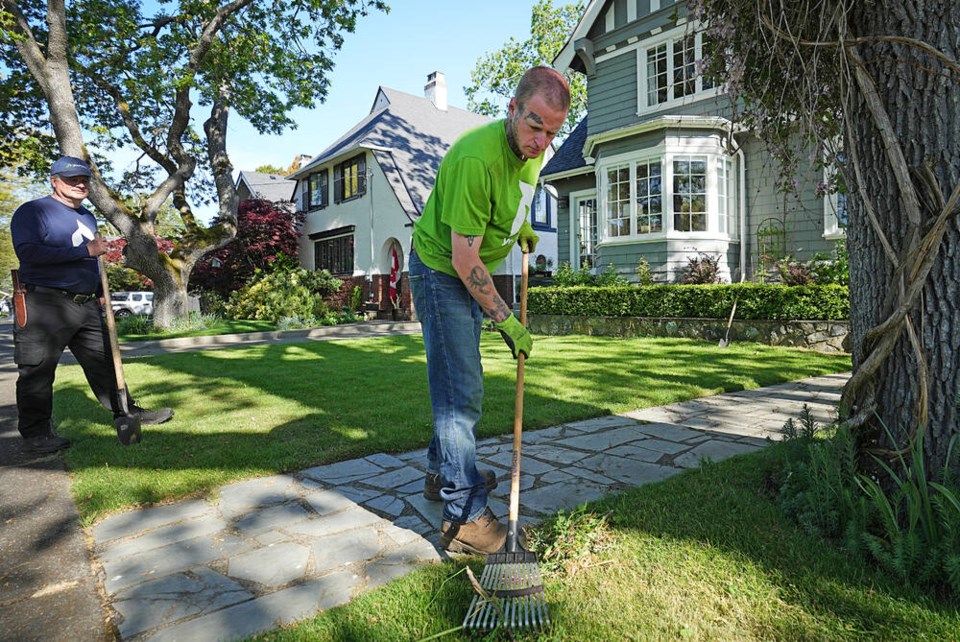It’s a sunny Tuesday morning in May, and Kyle Rines is on his stomach pulling weeds out of a garden outside a Rockland home.
He’s just two months into his first landscaping job, and he already looks at home with his hands in the dirt.
Four years ago, while waiting for surgery after an accident, Rines started drinking again.
The 34-year-old former restaurant owner had moved to the Island from Kingston, Ont., to be near the specialist surgeon who would repair his hip and femur, shattered by two cars that hit him while crossing the street.
New to town and isolated by pandemic restrictions, Rines turned to alcohol after six years of sobriety to cope with his loneliness.
“I got a beautiful apartment, you know, pool table, like the whole nine yards, the TVs, all that crap. And I thought that was gonna be OK, but it’s amazing when you’re alone how quickly the novelty of things fades,” Rines said.
His life deteriorated, leading to trouble with the law and serious health problems. Rines realized he would die if he continued drinking.
With some help from his probation officer and his own persistence, Rines landed a spot in a long-term recovery program in View Royal.
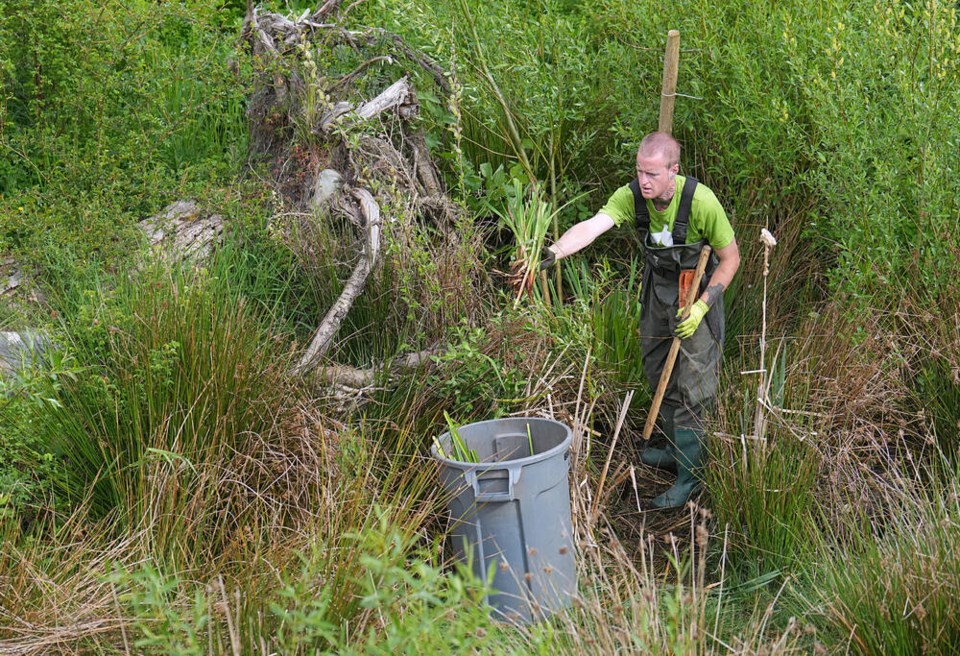
He threw himself into the program at New Roads Therapeutic Recovery Community, run by Our Place Society, where he spent about 10 months rewiring his relationship with himself.
“I went there expecting to just get sober, but I had a whole entire outlook change on life,” he said.
That program is how he found himself working in the garden of Lana Quinn’s Rockland home one morning in early May. After finishing the New Roads program, Rines became one of the first men hired at Our Place’s new social enterprise.
Your Place, a landscaping company, began operating in March, with Rines and fellow New Roads alum Daniel Wright led by operations manager James Pegg and general manager Paul Latour.
Another crew member was hired out of New Roads, but he relapsed, Latour said. He is welcome to return to the job when he’s sober.
New Roads, which opened in 2018 in a former youth detention facility, can house up to 40 men with moderate to severe substance-use problems who are motivated to change their lives.
A women’s community, separate from the men’s side, opened this year, with the first resident moving in at the start of March. There are currently 14 women in the program.
Rines and Wright are among roughly 350 men who have completed the New Roads program, which lasts between nine and 24 months.
About one third of the men enter directly from the criminal justice system, while the rest come from Island Health facilities, such as a detox centre or hospital bed, and from the community through referrals by agencies, family or themselves, said Cheryl Diebel, director of New Roads.
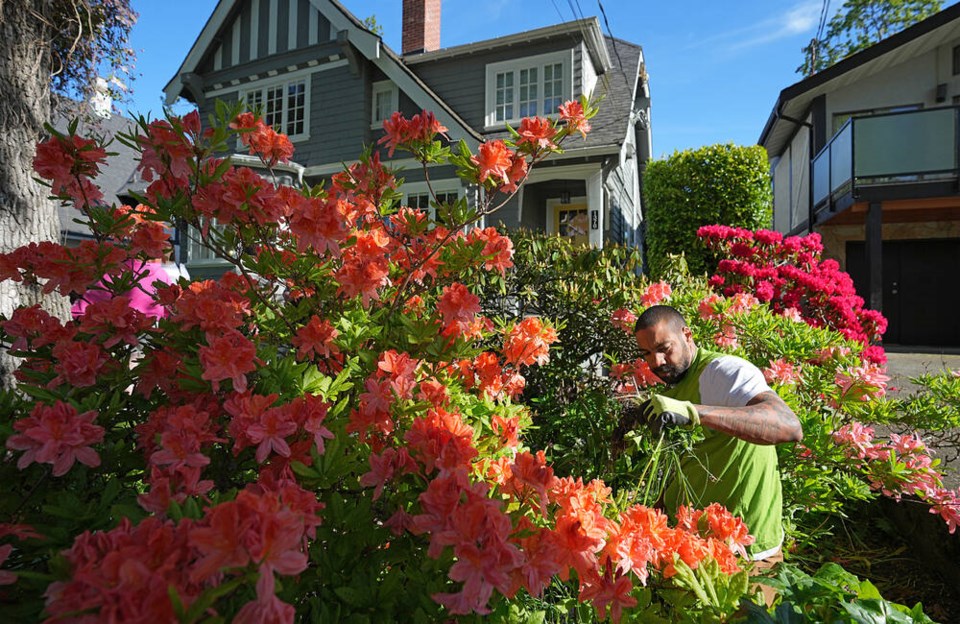
The days are structured to give the men stability and routine, something that has often been lacking in their lives, she said.
They wake up at the same time every weekday for breakfast and a morning walk, before heading into programming with their counsellors to learn skills to emotionally self-regulate and avoid relapse.
In the afternoons, the men participate in “work as therapy,” where they learn practical skills by together taking care of their home at New Roads.
They’re responsible for all the cleaning in the complex, maintaining the gardens and greenhouse, caring for the chickens and bees and working with the chef to help with daily meals.
The program begins as a closed community. Participants give up their cellphones, internet and visits from friends and family to avoid outside influences and distractions.
“The first thing that happens when you come to New Roads is we want you to focus on you. We want you to focus on where you’re at, how you got there, what’s happening for you, looking at your addiction,” Diebel said.
After the initial orientation, participants can begin reconnecting with loved ones and having regular visits, and shift their focus to their wider community, she said.
In the third phase, men start to leave the New Roads grounds for programs to begin reintegrating in the community at large.
The fourth phase sees men start looking for employment, which can be a challenge because of the stigma attached to addictions and criminal records. Some of the men have gaps in employment, which can also be an obstacle to getting hired, Diebel said.
That’s where Your Place comes in.
An ‘opportunity to lift themselves up’
The idea for a social enterprise came from Our Place CEO Julian Daly, who helped to start social enterprises in Edmonton that now employ more than 150 people and make over $5 million in revenue. He had a vision for replicating that in Victoria.
Paul Latour, who had helped to renovate New Roads as the founder of HeroWork — a donor-driven volunteer group that completed renovation projects for social agencies before it closed in 2023 — was hired to determine what kind of business would suit New Roads alumni and the market.
Latour settled on landscaping because it has a low start-up cost, it’s outside work that can be done in a team and it suits the skills people develop at New Roads.
Your Place launched in March, advertising itself through Our Place’s network to attract customers who want to support its vision. The company is looking for customers who care about its social impact, Latour said.
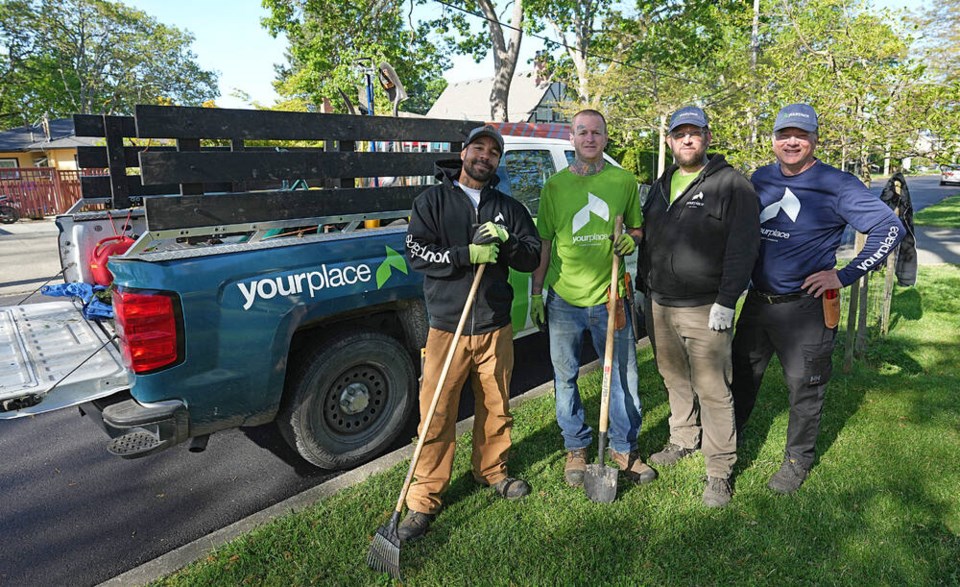
It prioritizes relationships within the team and with customers, while guaranteeing satisfaction with their work, he said.
“It’s about getting to know each other… and giving people who have earned [it] the opportunity to lift themselves up. That’s the win-win-win that I think really helps to empower our community,” Latour said.
Chantal Meagher and Phil Calvert, who sits on the board of Our Place, were some of the company’s early customers.
The couple had in the past resisted hiring gardeners to tend to their Rockland property, opting to do the work themselves.
But hiring the social enterprise was a “no brainer,” Meagher said.
“It’s contributing, not only to, of course, making our garden more beautiful, but it’s also, I think, helping people get themselves re-established after a difficult time. And I think that’s really important,” Calvert said.
In addition to residential jobs, the crew takes on commercial work.
At B.C. Transit’s new HandyDART facility in View Royal, they’ve worked to remove invasive species from a creek surrounding the centre, returning it to its natural state. It’s an ongoing project that came out of a partnership between B.C. Transit and New Roads, which is just down the street from the new facility.
Men from New Roads received training to remove invasive species and volunteered their time. Recognizing the need for long-term maintenance, B.C. Transit expressed an interest in working with Your Place before the crew was even hired, said Levi Timmermans, director of project delivery at B.C. Transit.
Timmermans said using a large government contract to support individuals in gaining skills and confidence as they come out of the recovery program has long-term social benefits for the community.
“Who doesn’t want to participate in something that has an intangible benefit?” he said.
‘I was in a really dark place’
Outside the HandyDART facility one morning, Wright is removing Scotch broom and hauling a garbage can full of the weeds back to the company truck under the hot sun.
Like Rines, Wright started drinking at a young age. What began as a social habit turned into a coping mechanism.
Wright was a fairly functioning alcoholic until three years ago, when his mother died of cancer, and his addiction spiralled. He began drinking and using cocaine daily to numb the pain of his loss.
“I was in a really dark place,” said Wright, who grew up in Victoria and spent the last two decades in Ucluelet.
Recognizing he needed help, he took himself to the Tofino hospital, which shipped him to Nanaimo’s psychiatric ward.
After seeing a doctor, Wright was told he was being discharged, because there was nothing doctors could do for him.
“I had to beg for them to keep me there, because I was like I don’t know what’s going to happen if I get released in Nanaimo right now,” he said. “Chances are I probably would have gone and just gotten screwed up and probably OD’d or something.”
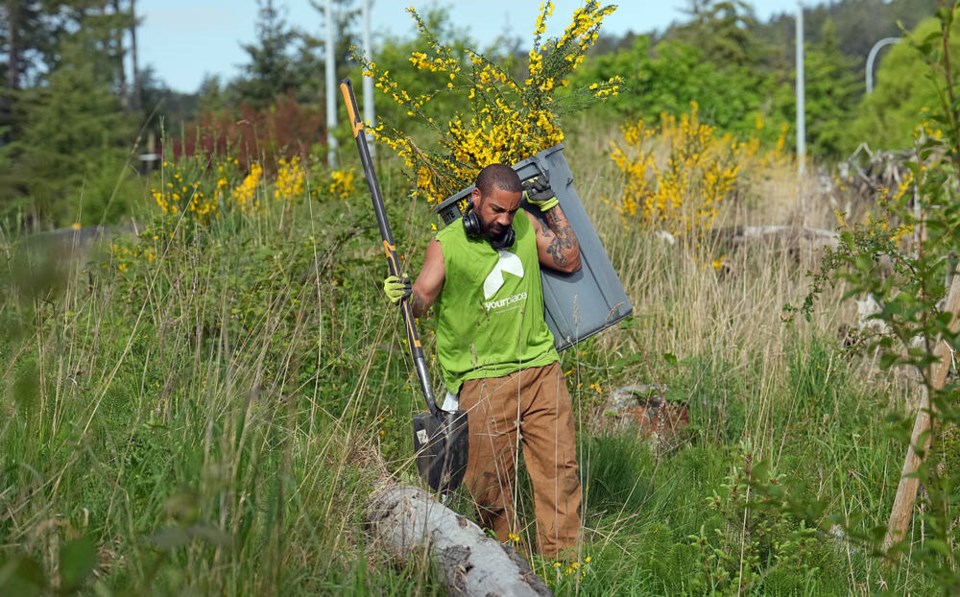
Wright called his brother in Victoria, who came to get him the next day. Through a series of lucky breaks, he quickly found his way to New Roads, beginning the program last July.
It was a bit of a full-circle moment for Wright, who had spent a week at the facility when he was 15 and it was still a juvenile detention centre.
When Wright arrived at the complex last year, the men were out for their morning walk. Wright steeled himself as he walked up to the gates.
“There’s 40 guys on the other side, all tattooed and looking tough and all that, and all eyeballing me. And I’m standing there, like, OK, here we go. And then the gates open, and they all start walking out, and they’re like:, ‘Hey, welcome brother,’ ” he said.
He realized he didn’t need to protect himself there.
Plans for more social enterprises
Wright graduated from the program at the end of April and moved into his own apartment in Fernwood, not far from the Rockland gardens he works in.
Both Wright and Rines were drawn to Your Place not just as a way to support their own recovery, but also for other alumni who eventually join the crew.
Your Place just hired a new field technician who is still at New Roads and started last week. The company is in the process of interviewing and hiring to have another crew up and running for summer, Latour said. They hope to hire a third crew next year.
The long-term vision is to create multiple social enterprises in different industries to give the men and eventually the women coming out of New Roads choices about what fields to pursue, he said.
If the company grows enough, they plan to expand the search for employees to the greater Our Place community and other social-service agencies.
All profits go back into the business to hire new staff and eventually fund new social enterprises.
For operations manager Pegg, who has 20 years of experience in the landscaping industry, that model has required him to shift his focus from the bottom line to the health and well-being of the crew.
It’s the kind of meaningful work he has spent years looking for, he said.
“This isn’t a landscaping company. We are trying to start a company that creates a safe, supportive environment,” he said.
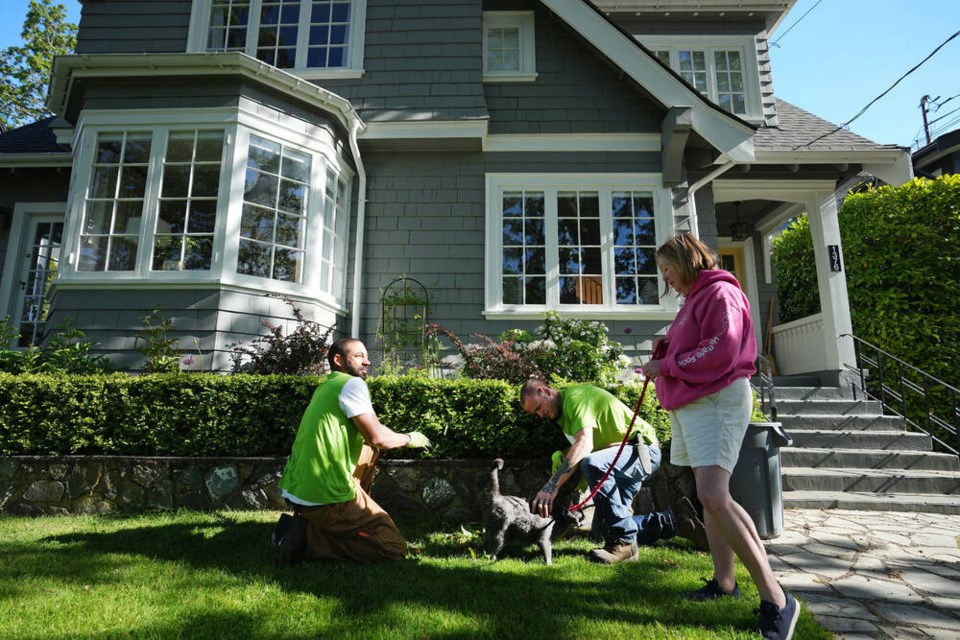
Pegg has not gone through the New Roads program but has lived experience with addiction, calling himself “a very functioning addict” for most of his life, until his body decided to quit on him and he was given a 40 per cent chance of survival.
“Over time, I’ve realized where the root was and the reason why programs didn’t work for me is [I] hadn’t dealt with it. I hated myself,” Pegg said.
A shared experience of addiction helps him understand where his crew is coming from, but he doesn’t think it’s essential to their bonding. Rather, a willingness to be vulnerable bonds them, he said.
Lana Quinn, who lives down the street from Meagher and Calvert, signed up for an annual contract with Your Place after a referral from her neighbours.
Quinn said she has struggled to find good landscapers in the city and she was drawn to the social enterprise as a way to get the work she needed done while feeling like she’s making a difference.
On that warm May morning after the crew finished working in Quinn’s garden in Rockland, Pegg gave her a card, signed by each member of the team, thanking her for the opportunity.
She was touched by the gesture. As Pegg offered her a hug, tears welled in Quinn’s eyes.
“I’ve definitely never had that from someone who came to work in the yard,” she said.
